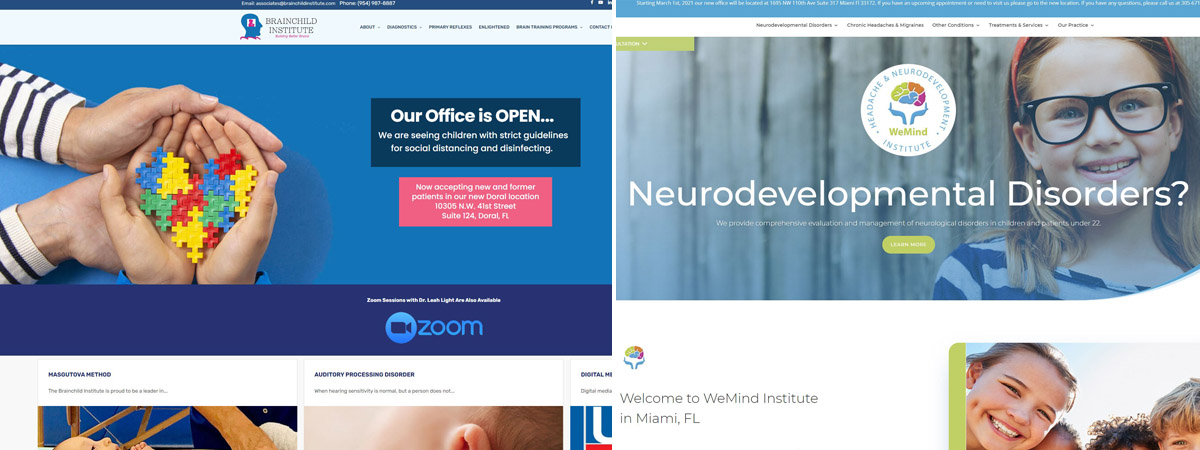Dr. Leah Light, Audiologist and founder of The Brainchild Institute and Dr. Elza Vasconcellos, Pediatric Neurologist who specializes in Neurodevelopment and Director of WeMind Institute.

I had the privilege to meet with both Dr. Leah Light, Audiologist and founder of The Brainchild Institute and Dr. Elza Vasconcellos, Pediatric Neurologist who specializes in Neurodevelopment and Director of WeMind Institute. It was remarkable to listen to their conversation because both ladies are passionate about helping children and so compassionate about what a child goes through every day at school. They also talked about how hard it is to refer parents to specialists.
Dr. Vasconcellos explained that a child who can't function in school; will worry all the time, and the stress makes them freeze (It can be somewhat confusing when you see your child in freeze mode because his/her lack of action may lead you to believe that they are calm, when in fact, they are just numb). Therefore, they can't possibly think of how to do their work. Oftentimes, I know from my own experience, children get such bad anxieties that they either switch off and avoid doing any work, or they will act out. Girls will stare out the window and daydream, wishing they were someplace else, or/and cry a lot. Boys tend to act out or be the "Class Clown" rather than cry in front of people.
Imagine a misdiagnosed child who has Auditory Processing, Visual Processing, or Sensory Processing disorders who can't possibly do their work. Then, throw in ADHD since there is also Executive Function Disorder to deal with, where the child can't even organize their thoughts to regulate themselves and turn in their work on time, and all of this makes a recipe for disaster.

Often, parents have no idea why their child is not succeeding in school. After all, as parents, we like to believe that the school system should have everything under control? But many times, the parent finds out that no matter what they do or who they go to for help, it costs an absolute fortune and nothing seems to help. This process can be very stressful for the parents, who naturally will worry and wonder what they can do to help their child. It affects the entire family, for example, if the child has siblings that are considered normal, they don't understand why you are focusing on the child that is struggling, the siblings might feel like you are favoring the one child with the learning difference. On the other hand, the child with the learning difference thinks that you praise and are so proud of your "norm" child that they are treated unfairly. So if you as a parent find yourself in this situation, I urge you to advocate for your child and understand that he or she does not get up in the morning with the intention to cause these problems but for sure needs to get help outside of school. A good Vision Therapist or Audiologist is hard to find, but they are out there.
Additionally, there are teachers who think that your child can do the work, but they just won't put their mind to it. The teacher might think that the child is capable but would rather be in the playground. Not fully understanding what the child is going through, the teacher will take away their recess, only allow them out once they have finished their work. Under this situation, the child misses any sort of release from their misery. For teachers and parents alike, we complain about children with APD, that they "just won't listen" or will not do what they are told to do. These poor kids can't process what they are being told. Some of them hear " blah, blah, blah," and some of them just hear unintelligible noise.
In my opinion, it is the kids with Visual Processing that get the worst treatment. They can read well because they don't comprehend what they are reading. Many times, both teachers and parents just don't understand. We say, "but you just read it. Now answer the question." The child doesn't even know what they read, so can't possibly answer the question. Many kids that are undiagnosed would rather read an infant's book as they understand the small words and short sentences. From their point of view, if every other kid can do the assignment in the class, why can't they? They lose all confidence in themselves and think that there is something wrong with them; is a downward spiral after that.
Dr. Light has done a vast amount of research about these special kids and recently gave a speech at a conference in Minnesota to fellow Audiologists. She explained that she has found through her research that the majority of these children who have processing disorders can also be diagnosed with ADHD. Dr. Light also said that each child is so different that each diagnosis should be individual. In my opinion, I think that a large number of children who have processing disorders are labeled with ADHD, and in many cases, if the child can get help from great doctors like Dr. Light and Dr. Vasconcellos, they would be able to thrive in school. If a kid hates going to school there is a reason, especially if they cry, panic, or fake an illness. If a child has a learning difference, they will be treated differently at school, not only by the other kids but also by the teachers. As we are well aware, when a child is perceived different, they are bound to get bullied at school; this opens a whole other can of worms.

I look forward to working closely with Dr. Vasconcellos as she has so much to teach parents like me. But the goal for Dr. Light, Dr. Vasconcellos, and myself is to educate teachers and parents that there is help out there; there is a light at the end of the tunnel. It is Dr. Lights and my opinion that VPD, APD, EFD, and ADHD are all connected. And if you can iron out each one, you will be giving your child the best opportunity possible.
If you would like to make an investment that lifts lives, brightens futures and strengthens the community, consider helping us. Please use the donate buttons below to select a secure method of online payment through PayPal, which allows donations by debit or credit card (PayPal keeps a two percent transaction fee for each donation).